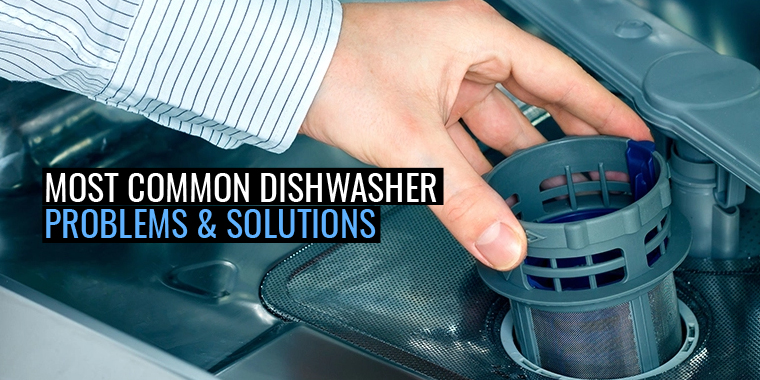
Apart from a refrigerator and a microwave, the dishwasher has recently come to be recognized as essential kitchen equipment. You are likely familiar with Dishwasher problems if you have a dishwasher. Just consider what will happen if the equipment breaks down. The everyday tasks for the entire family could then need to change.
So, a little upkeep goes a long way regarding dishwashers, but everything lasts a while. But it doesn’t imply there’s no hope. Some of the most typical dishwasher issues may be resolved with a few easy fixes, restoring the glitter to your life and your dishwasher.
Top three common dishwasher problems and solutions:
Dishwasher problems, ranging from dirty dishes to weird sounds and leaks, may be annoying and time-consuming. But don’t give up if your dishwasher is challenging to use. Here, you can discover the answer!
1. Dishwasher is not draining
You can have a problem with your dishwasher’s drainage system if it needs to be draining correctly. Several problems may be the root of this:
- Drain blockage: Food particles or other material may have clogged the dishwasher’s drain.
- Pump malfunction: The pump in the dishwasher is in charge of circulating water through the drain system.
- Broken or clogged hose: If the drain line for the dishwasher is broken or clogged, water may build up in the system.
How to fix it:
You can try the following procedures to attempt to resolve the Dishwasher problems:
- Check for obstructions in the drain. Use a plunger or a pipe snake to remove any obstructions in the drain that the debris may cause.
- If you believe the pump may be the problem, consult the owner’s handbook or contact a reputable appliance repair shop.
- Examine the drain pipe for damage or obstructions. The hose must be straight and clear of obstructions and kinks.
2. Dishwasher smells bad:
If your dishwasher smells unpleasant, the device can have a problem. To identify the issue:
- Look for any accumulation of food debris and noticeable mold or mildew symptoms.
- Verify the condition of all the gaskets and seals. If they are not, they can allow moisture inside, which could result in a musty odor.
How to fix it:
- Get the filter clean. The filter may quickly become a haven for germs and mold as it gathers grease, dirt, and food particles.
- It should be removed from the dishwasher and scrubbed with warm, soapy water to make it clean.
- Use a cleaning agent made specifically for dishwashers, or create your own by combining vinegar and water in equal amounts.
- Spray the mixture over the dishwasher’s door, bottom, and walls, then wait a few minutes before closing it.
3. Dishwasher doesn’t clean dishes properly:
Washing your dishes inadequately is one of the Dishwasher problems; there are a few things you should watch out for:
- Check to see if the dishwasher is completing its cycle. If not, a mechanical fault is probably to blame.
- If your dishes are still unclean after the dishwasher has finished its cycle, see if the detergent cup isn’t releasing the detergent properly.
- Verify that the water’s temperature is set correctly. The dishwasher won’t be able to thoroughly clean the dishes if the water temperature is too low.
How to fix it:
- Make sure the dishes are not blocking the dishwasher’s spray arm and avoid overloading it.
- While using too little detergent might, using ineffective washing, using too much can leave a residue on the dishes.
- Make sure the dishwasher’s water is hot enough to efficiently clean the dishes by checking their temperature.
Conclusion:
The helpful advice in this article should have helped you get rid of your Dishwasher problems and get back in working order. However, if your DIY project has failed and repair services cannot revive it, walk to a professional who will help you.
